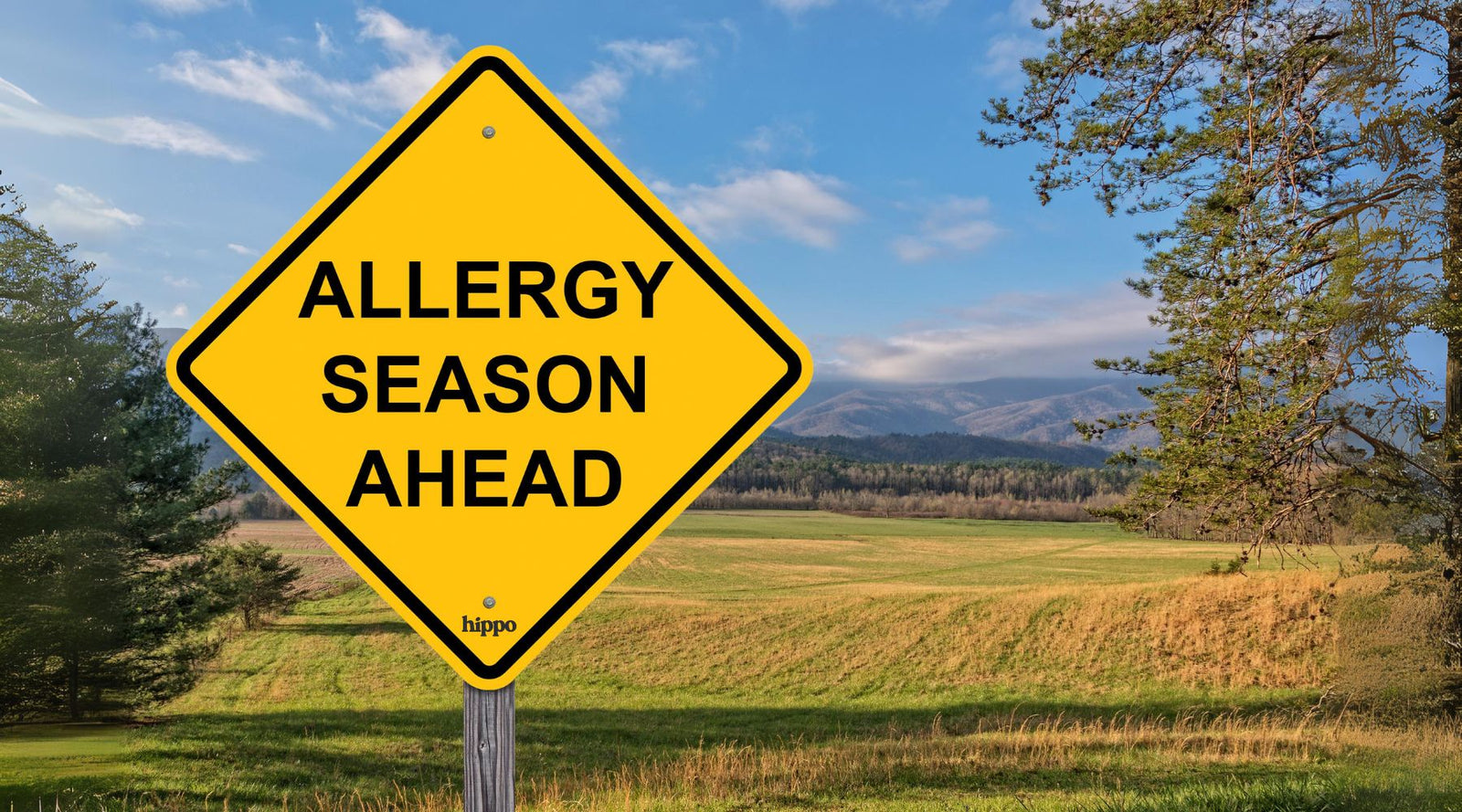Horse & Rider
Seasonal Allergies in Horses, Pets & People: Causes, Symptoms & Remedies
by Fiona Lane September 02, 2024

Managing allergies like hay fever and skin irritations in our horses, dogs, cats and ourselves can be a frustrating challenge. With so many allergens around, it can be tricky to identify the cause to ensure you’re using the right treatment. In this blog post we look at the causes and symptoms of different allergies for horses, pets and people and how to manage them, including using our range of remedies formulated by our qualified homeopath. Whether it's pollen, dust, grass or animals that are causing a reaction, our remedies offer a gentle and effective approach to getting through allergy season.
ALLERGIES IN HORSES
There are so many allergens that can cause hay fever-like symptoms and itchy skin in horses, so it’s important to identify what’s causing the issue to ensure your valuable time and money is spent on the right treatment. If your horse is itchy and you’re not sure why, read this blog post for tips and advice on identifying the cause. As always, if your horse’s condition is serious or persistent, we recommend talking to your vet.
POLLEN & GRASS ALLERGY
Cause: Horses can be affected by spring pollen releases from grasses, shrubs and trees, particularly pine trees for those living in New Zealand. The immune system can become hypersensitised to specific allergens resulting in an overproduction of antibodies when those allergens are present, usually during spring and summer.
Symptoms: Allergy to airborne pollens can cause coughing, wheezing, welts, or nasal discharge, head shaking, lethargy and a lack of concentration. If the allergy is caused by contact, there may be hives and a general itchiness that isn’t confined to a particular area.
Management: For allergies to airborne pollens, avoid turning out or riding on days when the pollen count is particularly high. If that isn’t practical, then try adding our Pine & Pollen remedy to the water trough – it’s an easy and cost effective way to support your horse or your whole herd. If you suspect a contact allergy, then our Grass Allergy – Equine could be worth trying. Both of these remedies are formulated to densensitise horses to their environment as well as assisting with relief from symptoms.
DUST ALLERGY
Cause: Dust mites live in hay and on bedding and fabric, where they can feed on the dead skin cells shed by your horse or other animals. Dust mites have proteins in their faeces that are usually harmless, however the immune system of some horses views these proteins as harmful, triggering an allergic reaction.
Symptoms: Similar to pollen and contact allergy, except symptoms are worse when horses are inside. Symptoms include watery eyes, congestion, runny nose, sneezing, wheezing or coughing. If you are ever concerned about your horses breathing, please call your vet immediately.
Management: While you can limit time in the stable, this isn’t always practical. Try buying low-dust or dust free bedding products, soaking hay and dampening feed to prevent allergens from becoming airborne. Keeping their stable/yard clean and regularly washing and airing of rugs and other fabrics is also helpful. You can also try our Dust Allergy – Equine remedy. It comes in a pump bottle format for direct dosing and jerry cans for adding to feed or the water trough.
GRASS MUMPS
Cause: It’s widely believed that Grass Mumps (parotiditis) is an allergic reaction caused by exposure to sugar-rich grass or pollens.
Symptoms: Swelling in the parotid salivary glands that sit behind the jawbone. Glands will often swell while the horse is at pasture, with swelling reducing once off pasture for 36 hours or more. The swelling is soft and not painful, and there aren’t usually any other symptoms or behavioural changes. If the horse shows signs of being unwell or off their food, has a fever, nasal discharge or abscesses near the lymph nodes, consult your vet.
Management: Keep your horse off grazing for a couple of days, and lift their feed off the floor to help the gland to drain. You could also use our Grass Mumps remedy to help with managing symptoms.
ALLERGIES IN DOGS & CATS
It can be frustrating – and expensive – to identify and manage any of the many conditions that could be causing your pet to feel itchy. Using the right treatment is important, but that means knowing exactly what it is that needs to be treated! Read this blog post for tips on identifying the most common skin ailments, along with suggestions on how to manage them. Of course, if your pet’s condition is serious or persistent, we recommend a trip to the vet for diagnosis and treatment.
POLLEN & GRASS ALLERGY
Cause: During spring and summer flowering grasses and pollen from trees and plants can cause our pets to have seasonal allergies. Dogs in particular can experience skin irritations when in contact with grasses and weeds that have been recently sprayed.
Symptoms: Airborne allergens can cause hay fever-like symptoms such as watery eyes, sneezing, wheezing, coughing and skin irritations. If your pet has a contact allergy, they will usually be itchy in areas where they have less fur coverage – such as all four paws (rather than just their front paws) and their belly. Their chin and bottom can also be affected.
Management: Keeping your cat or dog inside and away from airborne allergens and grasses isn’t easy, but try to limit outdoor time when the pollen count is high. For dogs, wearing something that covers their belly, and rinsing them down when they get home from a walk, can reduce contact allergies. For contact allergies, try our Skin Allergy – Underbelly remedy, or for pets who also have hay fever-like symptoms, try BioPet Grasses.
DUST ALLERGY
Cause: Even the cleanest house can still cause issues for pets with an immune system that over-reacts to irritation from the dust in carpet, upholstery or bedding. While some animals react to the dust itself, others react to the allergens produced by the faeces of dust mites that are likely to be present.
Symptoms: Pets with a dust allergy are usually itchy all over, all year round, despite having a clean coat and being free of fleas. You may see some pale pink, often round blotches on their skin when you part their fur.
Management: Regularly washing and airing their bedding can help, however it’s near on impossible to keep a house free of dust, even with wooden floors. We recommend supporting their immune system to reduce reaction to dust allergens using our Dust Allergy – Pets remedy.
FLEA ALLERGY DERMATITIS
Cause: When fleas bite, they inject a small amount of saliva into the skin, which is what causes the itching. Some pets are overly sensitive to this antigen which can result in intense and severe itching, leading to dermatitis. This type of allergy is most common during spring and summer.
Symptoms: Constant scratching, licking, or nibbling at the skin to the point where the fur becomes brown, or there is fur loss from the middle of the back to the base of their tail and down their rear legs.
Management: Keeping up-to-date with your chosen flea treatment and ensuring bedding is regularly washed and aired can help to minimise flea bites. You can also try dosing with our Flea Allergy – Pets remedy. However, it’s important to understand that sometimes the flea still needs to bite the animal to receive a lethal dose of the flea treatment chemical. Our BioPet Fleas & Ticks works slightly differently – it subtly changes the body odour of your pet so fleas and ticks don’t see them as their next meal! Read our blog post for more tips on natural ways to manage fleas and ticks.
FELINE ECZEMA
Cause: Feline eczema – or atopic dermatitis – is caused by contact with or inhalation of allergens from a wide range of environmental sources. Dust, grass, pollen, fungi, mould, cat litter, cleaning products, flea control products, medication, food, fabrics such as wool or nylon, and perfumes are all common causes.
Symptoms: Your cat may be itchy resulting in excessive scratching, licking or biting. They may experience hair loss in areas where they are itching the most, and may have oily fur and dandruff as a result of small, crusty bumps on their skin.
Management: Working out what is causing the problem is the best solution, but also the trickiest given the sheer number of possible causes. Buying hypoallergenic food, changing their bedding, using a different cat litter and flea treatment are all good places to start. While you are working out the cause, you can support a normal immune response by dosing with our Eczema Feline remedy.
ALLERGIES IN PEOPLE
We also make a range of remedies for people who experience allergic reactions to pollens and grasses, dust and animals.
POLLEN & GRASS ALLERGY
Cause: In humans, Hay Fever is a catchall for any condition caused by pollen, grasses, flowers, privet, and house dust. The time of year that symptoms strike often indicates which specific pollen is causing a reaction. If you experience symptoms all year round, then the issue could be dust.
Symptoms: Watery, itchy or red eyes, itchy throat/mouth/nose, sneezing, coughing, hives, mild skin irritation, headaches, feeling tired, irritable and generally miserable are all symptoms of an allergic reaction to airborne allergens.
Management: Try to stay indoors when the pollen count is high, or avoid plants you know you react to by removing them from your property (ie. privet). Anti-histamines are a common solution for hay fever, but if you’d like to try a natural remedy formulated by our qualified homeopath, try our Hay Fever Plus. This remedy doesn’t cause drowsiness and is safe for long term use.
DUST ALLERGY
Cause: The dust in our homes can contain pet hair and dander, mould, pollen spores, dust mites and insect droppings that can easily become airborne, triggering a reaction when inhaled or make contact with skin.
Symptoms: A dust allergy will cause very similar symptoms to a pollen or grass allergy – watery, itchy or red eyes, itchy throat, sneezing, coughing, hives, mild skin irritation or feeling tired and irritable. Unlike a pollen or grass allergy which tends to be seasonal, a dust allergy will cause symptoms all year round.
Management: Investing in a good vacuum cleaner and ventilation system can help, and there are lots of products on the market for wrapping mattresses and pillows to reduce exposure to dust. Taking antihistamines is another common way to manage this ailment. As a natural alternative, our Dust Allergy – People remedy can be used to help with desensitisation, as a preventative or to manage acute symptoms when they arise.
ALLERGIES TO ANIMALS
Cause: Allergies to animals – particularly cats - are relatively common. When cats lick their fur they cover it in saliva, which contains a protein that some humans react to. This fur then sheds, sticking to fabrics, furnishings and clothing, and as it is very light, can easily become airborne and inhaled. Dogs shed dander – which is similar to human dandruff but smaller, lighter, and more easily airborne. Dander also contains saliva which, when inhaled by humans, can trigger an allergic response.
Symptoms: Hay fever-like symptoms such as watery, itchy or red eyes, itchy throat/mouth/nose, sneezing, coughing or wheezing. If you have asthma you may be more prone to being allergic to animals.
Management: Unfortunately both the animal and any places they have been needs to be avoided. If you are allergic to your cat or dog, try restricting the animal to certain parts of the house, keeping them out of your living area and bedroom. Some cat breeds may produce less allergen that others, but as a rule, there are no hypoallergenic cats. If you are feeling brave, regularly wiping a cat down with a damp microfibre cloth to remove loose fur can help. The news is better for dog owners – dog allergies are less common and some dog breeds do produce less dander or shed less and so are considered hypoallergenic.
We have several professionally formulated remedies that are safe for people of all ages, that can help to reduce allergic reactions to animals:
- Cat Allergy Plus can be used as a preventative, or to manage an acute attack of symptoms.
- Allergy to Dogs Plus for allergic reactions to dogs and dog dander.
- Allergy to Horses Plus for those who experience hay fever-like symptoms when exposed to horses.
We hope this blog post has helped with understanding the causes and symptoms of different allergies in horses, dogs, cats and people, and provide some useful tips for management of these frustrating ailments! Remember, if you’re struggling with persistent allergies, always consult with a professional to find the best solution. Here's to a more comfortable allergy season for everyone.
General Disclaimer: Always follow dosing instructions. Our remedies are formulated to support the natural immune system of horses, pets, livestock, and people. We do not claim to treat, medicate, or cure any health conditions. If you are worried an animal may be in pain or suffering, please contact your veterinarian.




